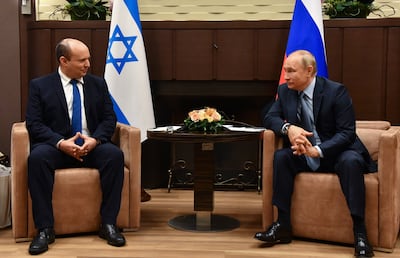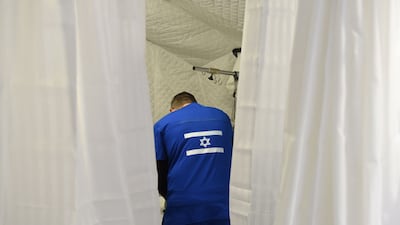The emergence of Israeli Prime Minister Naftali Bennett as a key interlocutor in trying to resolve the Ukraine crisis has much to do with Israel’s enduring concerns about Iran’s malign activities in the Middle East.
Israel and Russia may not be natural allies, but relations have improved in recent years as Israel has sought closer relations with the Kremlin. The main driving force this effort, which dates back to the premiership of former Israeli Prime Minister Benjamin Netanyahu, has been to persuade Russia not to obstruct Israel’s attempts to rein in the activities of Iran’s Islamic Revolutionary Guard Corps.
Apart from Israel’s long-standing concerns about Iran’s nuclear activities, it is also opposed to Tehran’s attempts to establish military bases in southern Syria which can be used to launch attacks against Israelis.
Consequently, when Mr Bennett flew to Moscow two weeks ago for face-to-face talks with Russian President Vladimir Putin at the Kremlin, the conversation focused as much on Israeli concerns over Iran’s malign activities in the Middle East as they did on the Ukraine crisis.
“For Israel, the Ukraine crisis is an unwelcome distraction from issues that really concern Israelis, such as the nuclear deal and Iran’s expansionist activities in Syria,” a senior Israeli official with knowledge of the Putin-Bennett summit told me. “These were the issues that really dominated their conversation.”
So far as Ukraine is concerned, Israel is attempting to adopt a nuanced position. While the Israelis voted alongside the US and other western countries at the UN General Assembly earlier this month to condemn the Russian invasion, Israel has so far declined Ukrainian requests to send military equipment, including defensive weapons such as anti-tank and anti-aircraft missiles.
Instead, the Israelis are concentrating their efforts on humanitarian relief, with around 100 tons of aid already having been flown to the region, including six generators sent to Lviv hospital. A field hospital, staffed by more than 80 Israeli medical personnel, has also been set up inside Ukraine near the Polish border.
Israel’s lukewarm response to Ukraine has not been well-received by Ukrainian President Volodymyr Zelenskyy, who is himself Jewish and has criticised Israel for not doing enough to support the Ukrainian people. In Tel Aviv, the Ukrainian ambassador to Israel, Yevgen Korniychuk, even donned a combat helmet at a press conference, and asked why Israel was proving reluctant to provide lifesaving supplies.
But Israeli officials insist their delicate balancing act is working, as it has enabled Mr Bennett to maintain a dialogue with Mr Putin, with the two leaders continuing to speak on a regular basis. In their latest call earlier this week, Mr Putin gave the Israeli premier his assessments on the current state of negotiations to end the conflict, as well as giving an update on what the Kremlin calls Russia’s “special military operation” in Ukraine.

But while Israel, in common with most other countries, is keen to see an end to the violence in Ukraine, the Israelis are also focused on safeguarding their own national interests, especially their ability to strike at Iranian targets inside Syria.
Of particular concern is the need to maintain the so-called “deconfliction mechanism” it has set up with Russia in Syria.
The arrangement, which has been in place since September 2015 when Russian forces first intervened in support of Syrian President Bashar Al Assad, allows Israeli military officers in Tel Aviv to alert their Russian counterparts in Syria’s Hmeimim air base when they are planning to launch attacks against Iranian targets in Syria. This has enabled the Israelis to launch hundreds of air strikes against Iranian assets, allied militias and weapons shipments.
Israeli officials believe the attacks are vital for preventing Iran from consolidating its presence in Syria and strengthening its ability to attack it.
Mr Bennett has also taken advantage of his cordial ties with Mr Putin to raise the status of the Vienna nuclear talks between Iran and world powers aimed at reviving the 2015 nuclear deal.
Russia has been supporting Iran’s position in the nuclear talks, where Tehran wants to see punitive economic sanctions lifted in return for agreeing to limits on its nuclear activities. Hopes have been raised in recent weeks that a deal may be announced soon, but the Israelis have made the Kremlin well aware of their opposition to any such deal.
The prominent role Israel has been playing in diplomatic efforts to resolve the Ukraine crisis reflects a deepening sense within the region that responsibility for resolving key regional issues, such as the threat posed by Iran’s nuclear ambitions, lies with the region’s leaders, not the West, as has traditionally been the case.
One of the big complaints of Arab leaders, especially in the Gulf, about the 2015 nuclear deal is that their concerns and security needs were excluded from the negotiating process, which was largely driven by former US President Barack Obama.
But as the UAE’s Minister of State Khalifa Shaheen Al Marar said in an address to the UN Security Council earlier this week, there was a growing need for “Arab solutions to Arab issues”, and that it is important that the global community listens to Arab leaders to “consider their views” when dealing with complex regional issues.
The desire of regional leaders, moreover, to forge closer co-operation was evident at this week’s summit at the Egyptian resort of Sharm el-Sheikh, when Mr Bennett joined Sheikh Mohamed bin Zayed, Crown Prince of Abu Dhabi and Deputy Supreme Commander of the Armed Forces, to attend an historic regional summit hosted by Egyptian President Abdel Fattah Al Sisi.
The main topic of discussion at the summit was regional security.
At the very least, the summit demonstrated that, while the world’s attention remains fixed on the Ukraine crisis, there are also other major issues that need to be tackled. And when they relate to the Middle East, the ability of regional leaders to find solutions will be crucial to maintaining peace and stability.


